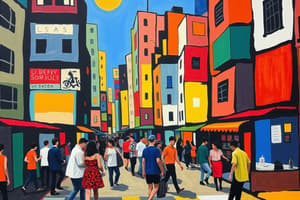Podcast
Questions and Answers
What is urban sociology?
What is urban sociology?
Urban sociology is a branch of sociology that seeks to study life in cities and their impact on society's development.
What event motivated the social scientists to study urban sociology?
What event motivated the social scientists to study urban sociology?
- The Postmodern Era
- The Digital Revolution
- The Agricultural Revolution
- The Industrial Revolution (correct)
What does urban sociology examine in relation to cities?
What does urban sociology examine in relation to cities?
Social structures and processes of modern urban ways of life.
Urban sociology emerged as a distinct discipline in the mid-twentieth century.
Urban sociology emerged as a distinct discipline in the mid-twentieth century.
Match the following sociologists with their focus areas:
Match the following sociologists with their focus areas:
Urbanization refers to the population shift from ________ to urban areas.
Urbanization refers to the population shift from ________ to urban areas.
Which of the following is NOT a focus of urban sociology?
Which of the following is NOT a focus of urban sociology?
Flashcards are hidden until you start studying
Study Notes
Urban Sociology
- Branch of sociology that studies life in cities and its impact on society's development
- Focuses on the causal connections between the elements of a city and the factors that led to their development
- Studies the impact of city life on social actions, relationships, and institutions
- Is a normative discipline focused on studying the structures, processes, changes, and problems of urban areas to inform urban planning and policies
- Its scope has significantly expanded over the years
Definition of Urban Sociology
- Study of social organization and interaction of population groups within the built environment, including highways, factories, housing developments, and commercial areas
- Deals with the historical forces behind modern industrial and corporate cities, the location of industrial and commercial areas, lifestyles of different groups within neighborhoods, and the effect of social, economic, and political forces on urban life
- Examines social structures and processes associated with modern urban life and its implications for city residents
- Attempts to focus on urbanized social ways of life and its impact on the surroundings, particularly suburbs
- Sociological study of various societal statistics among urban populations
Urban Society and Urbanization
- Urban society is the social organization resulting from the actions and interactions of city dwellers, including their engagement with the physical environment
- Urbanization refers to the population shift from rural to urban areas, the decrease in the proportion of people living in rural areas, and societal adaptations to this change
Emergence of Urban Sociology
- One of the oldest sub-disciplines of sociology, dating back to the mid-nineteenth century
- Emerged as a distinct discipline in the early 20th century
- Driven by the social changes caused by the Industrial Revolution and the development of cities
- Focuses on the urban environment's influence on individuals, their actions, relationships, institutions, and modes of thinking and interacting
- Examines the urban social milieu, the physical environment, the conditions that follow the socio-cultural and physical surroundings, and the associated consequences
- Social, economic, and technological forces operating through human social milieu play a determinant part in individual, familial, and urban life as roles and statuses undergo significant transformations, ultimately affecting their quality of life
Early Contributors to Urban Sociology
- The philosophical foundations of modern urban sociology originate from sociologists such as
- Karl Marx
- Ferdinand Tönnies
- Émile Durkheim
- Max Weber
- Georg Simmel
- These scholars studied and theorized the economic, social, and cultural processes of urbanization and its effects on social alienation, class formation, and the production or destruction of collective and individual identities.
Studying That Suits You
Use AI to generate personalized quizzes and flashcards to suit your learning preferences.




